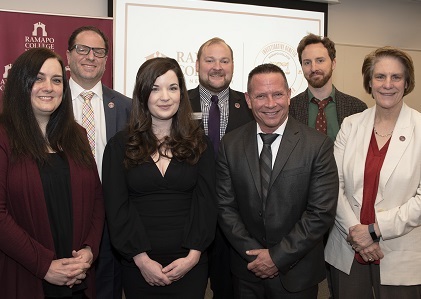
David Gurney (back right) and Cairenn Binder (front center) will helm the new IGG Center at Ramapo College of New Jersey. Credit: Ramapo College
A small public liberal arts college in Bergen County, New Jersey launched the world’s first investigative genetic genealogy center on Thursday.
Ramapo College of New Jersey’s Investigative Genetic Genealogy (IGG) Center will he led by David Gurney, Ph.D., JD, and Cairenn Binder, MS. Gurney is an assistant professor of law and society at Ramapo College, and was previously a fellow with the Wrongful Conviction Clinic (now the Innocence Project of Arizona) at the University of Arizona. Binder has been with the DNA Doe Project for five years, most recently as director of education and development, and just recently founded her own company, Coast to Coast Genetic Genealogy Services with two colleagues.
The overall vision of the new center is to “secure justice through the proficient use of IGG” to help resolve cases involving wrongful convictions, unidentified human remains, and violent crime—with a special focus on doing so in an ethical manner.
“While it’s true all the information we access in IGG is either publicly available or offered by consent, we still have a duty to keep the information we obtain in an IGG case about living peoples’ family relationships confidential unless required to release it by a court,” said Gurney. “IGG is very time-consuming and requires not only tenacity, careful attention to detail and logical reasoning, but ultimately, and perhaps most importantly, strong ethical standards. [The IGG Center will] help ensure that the upcoming generation of IGG practitioners are both proficient and ethical in their practice.”
Gurney holds a Certificate in Genealogical Studies from Boston University and is the president of the Investigative Genetic Genealogy Accreditation Board, which is currently developing standards for IGG—something many professionals feel is necessary for the rapidly growing field.
Growth, education and justice
To fulfill its vision, Gurney said the IGG Center will focus on three main tenants. First, IGG Center staff and students will provide pro bono IGG work to investigating agencies on cases involving wrongful conviction, unidentified human remains and violent crime. The Center is slated to take on at least five cases each year over the next three years with established pro bono partners, including Bergen County Prosecutor’s Office (NJ), The Innocence Project of Idaho and the Loyola Project for the Innocent. That list is likely to expand in the coming months as the IGG Center is currently in negotiation with additional partners throughout the country.
Right now, however, 2/3 of the partnerships are centered around wrongful convictions—something the IGG Center did purposefully. The second tenant of the center is to expand the reach of IGG, particularly to help exonerate the wrongfully convicted.
“Since 2018, over 500 cases have been resolved with the help of IGG,” said Gurney. “Of those 500 cases, only two involved wrongful convictions. I know there are many more cases out there that could be helped with IGG.”
The third and final tenant for the IGG Center is education. Binder joins Ramapo College as the Director of the new Investigative Genetic Genealogy Certificate Program, which will be enrolling students in the Spring of 2023. The program is the second of its kind, joining Claire Glynn’s version at the University of New Haven.
“I have witnessed a growing desire [in the last 5 years] from law enforcement and the genealogy and true crime community for accessible and affordable education programs teaching applied IGG,” said Binder. “[The certificate program] will meet the growing need for applied IGG education, delivered in an online environment that is accessible, affordable and designed for adult learners of all backgrounds.”
The IGG Lab will be housed in Ramapo College’s new Peter P. Mercer Learning Commons, giving staff and students enrolled in the IGG Workshop and IGG Certificate Program a secure location for the study and practice of IGG.
“To ensure the practice of IGG is here to stay, her to continue resolving cold cases, identifying John and Jane Doe remains, overturning wrongful convictions, and providing justice to victims of violent crimes, leadership is required,” said Binder. “Leadership is necessary to provide standards for the ethical practice of IGG, to provide an equalizing measure in our criminal justice system, to evaluate and expand its use, and to teach its application. Ramapo College is here to lead in the field of IGG.”